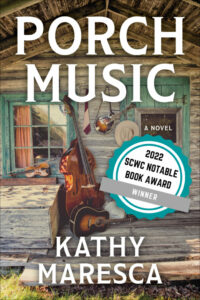by Kathy Maresca @so_tweet
Write what you know. Marjorie Kinnan Rawlings took this advice from her agent to heart. She wrote a story set in rural Cross Creek, Florida, where she lived. Soon The Yearling was published, and it won the 1939 Pulitzer Prize. Rawlings’ success encouraged me; I grew up just a few miles from her home.
A rehabilitation counselor turned novelist, I have fun creating fictional therapy sessions. It’s a chance to write what I know. Sometimes, though, I feel uneasy reading or watching a counseling scene because it has been written more like a journalist’s interview rather than a therapy session. It is important for authors to ensure that counseling scenes are true to their nature. Let’s consider how counseling sessions and journalists’ interviews differ.
A reporter’s interview has different goals and methods than a counselor’s session. My journalism professors taught us to get the story in one meeting. Journalists are obligated to learn the facts. Who, what, where, when, how and why. Yet counselors are taught to avoid asking why.
Back in grad school, I asked this question: why can’t we use why? My psychology professor explained that the word can be perceived as a challenge or threat. When clients respond to why, answers are not likely to be thought out or genuine. Instead of asking why, a mental health professional encourages clients to further open up by repeating some of the client’s key words and then saying this phrase: I’d like to hear more about that.
Tips from a counselor on how to write a counseling scene. @so_tweet #writing #ChristianFiction #ACFW Click To TweetIn client-centered therapy, a counselor is expected to show acceptance for the individual who seeks a path of healing. The facilitator allows the individual to admit his or her shortcomings without being judged. While a professional relationship builds, the counselor allows the client to set the pace.
On the other hand, journalists sometimes interview nefarious people. Reporters are not expected to have positive regard for a serial killer or to build a relationship with one. They are tasked to get to the point swiftly and to pass the information onto viewers and readers. Often they ask how does that make you feel? It can be provocative, a question eliciting an emotional response. The end result is something quotable for print. Something that brings tears, a visual for people who watch or read an interview.
Counselors are encouraged to avoid asking how does that make you feel. The word make carries a lot of force, rendering a person weak or helpless. Counseling encourages a person to take ownership of his or her decisions and to regain personal power. A counselor will ask something like this: I am wondering what you might be feeling right now. It’s okay if the client isn’t ready to reveal the reason for his or her pain.
Counseling is a process, a journey that is meant to help people work through difficult life situations and negative feelings about themselves. And unlike a journalist’s interview which is meant to convey information, mental health professionals are bound by professional ethics to keep information confidential.
Novelists write with a desire to have their words connect with readers. What if an author wants to write a counseling session but isn’t sure how it should read? I recommend asking a professional to review the dialogue and to give feedback. After all, we Christian fiction authors want a journey to better mental health to be more appealing than threatening.
Write what you know. For me, it has been Old Florida dialect and the Seminole Tribe stamped across the pages of Porch Music. In my second novel, backstory is revealed through counseling sessions. While it may be impossible to write a book everyone loves, we write authentically when we write what we know.
 An Air Force veteran, Kathy Maresca edited for the University of Florida and taught high school. She later earned a master’s degree and became a credentialed rehabilitation counselor. Kathy has been a Guardian ad Litem and volunteered for a prison ministry. With her husband, Keith, Kathy lives in North Carolina.
An Air Force veteran, Kathy Maresca edited for the University of Florida and taught high school. She later earned a master’s degree and became a credentialed rehabilitation counselor. Kathy has been a Guardian ad Litem and volunteered for a prison ministry. With her husband, Keith, Kathy lives in North Carolina.
